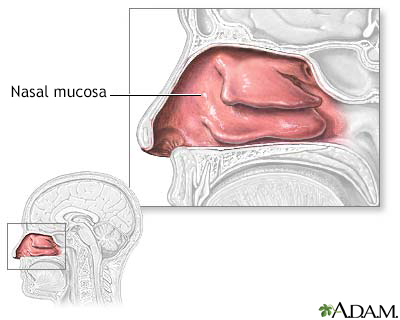Nonallergic rhinopathy
Definition
Rhinitis is a condition that includes a runny nose, sneezing, and nasal stuffiness. When hay allergies (hayfever) or a cold are not causing these symptoms, the condition is called nonallergic rhinitis. One type of nonallergic rhinitis is called nonallergic rhinopathy. This condition used to be known as vasomotor rhinitis.
Alternative Names
Rhinitis - nonallergic; Idiopathic rhinitis; Nonallergic rhinitis; Vasomotor rhinitis; Irritant rhinitis
Causes
Nonallergic rhinopathy is not caused by an infection or allergy. The exact cause is unknown. Symptoms are triggered by something that irritates the nose, such as:
- A dry atmosphere
- Air pollution
- Alcohol
- Certain medicines
- Spicy foods, and in some cases, while eating in general
- Strong emotions
- Strong odors, such as perfumes, cleaning products (especially bleach) among others
Symptoms
Symptoms include:
- Runny nose
- Nasal congestion (stuffy nose)
- Sneezing
- Watery nasal drainage
Exams and Tests
The health care provider will ask about your symptoms, when they occur, and what seems to trigger them.
You will also be asked about your home and work environment. The provider may look inside your nose to check if the tissues lining your nose are swollen due to inflamed blood vessels.
A skin test may be done to rule out allergies as a cause of your symptoms.
If your provider determines you can't have skin testing, special blood tests may help with the diagnosis. These tests, known as IgE allergen tests (ImmunoCAP; used to be called RAST), can measure the levels of allergy-related substances. A complete blood count (CBC) test can measure eosinophils (allergy-type white blood cells) to get a total eosinophil count. This may also help diagnose allergies.
Treatment
The main treatment is simply avoiding the things that trigger your symptoms.
Ask your provider if decongestants or nasal sprays containing an antihistamine are right for you. Corticosteroid nasal sprays may be useful for some forms of nonallergic rhinopathy.
Patient Education Video: How to use nasal sprays
When to Contact a Medical Professional
Call your provider if you think you have symptoms of nonallergic rhinopathy.
Gallery

References
Corren J, Baroody FM, Togias A. Allergic and nonallergic rhinitis. In: Burks AW, Holgate ST, O’Hehir RE, et al, eds. Middleton's Allergy: Principles and Practice. 9th ed. Philadelphia, PA: Elsevier; 2020:chap 40.
Sur DKC, Plesa ML. Chronic nonallergic rhinitis. Am Fam Physician. 2018;98(3):171-176. PMID: 30215894 pubmed.ncbi.nlm.nih.gov/30215894/.
Yan CH, Hwang PH. Nonallergic rhinitis. In: Flint PW, Francis HW, Haughey BH, et al, eds. Cummings Otolaryngology: Head and Neck Surgery. 7th ed. Philadelphia, PA: Elsevier; 2021:chap 39.